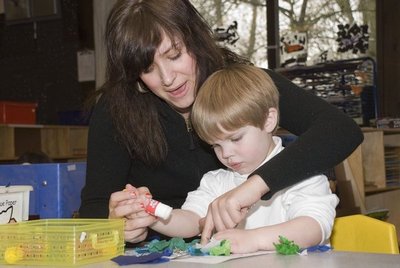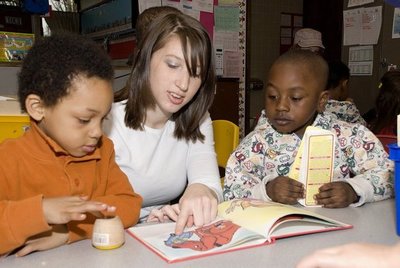April 10, 2008
Early Childhood and Family Studies program: Reaching students early with quality education
The new College of Education undergraduate degree path in Early Childhood and Family Studies answers a longtime need in a creative and interdisciplinary way, its creators say.
The program, various versions of which have been under consideration at the UW for several years, was approved by the Washington state Higher Education Coordinating Board last December. It began with a “soft launch” in fall, took its first few students in winter quarter and has about 30 students already participating for spring quarter.
“We spent most of last school year moving the proposal through the college, then through all the University committees, getting feedback,” said Susan Sandall, director of the program and an associate professor of special education in the College of Education. “The last I heard, the instructor was looking for a larger classroom. We think at least by word of mouth people are finding out about us — it’s very exciting.”
The new major is designed to give undergraduate students the chance to study development, early learning and family studies from many perspectives and across a range of disciplines. Students will take classes created specially for the degree and relevant courses from other departments.
“We have people here across a wide number of departments who do cutting-edge research in early childhood development and learning,” Sandall said. She is joined on the faculty for the new program by Brinda Jegatheesan and Gail Joseph, both assistant professors in educational psychology.
Students in the new Early Childhood and Family Studies program also will participate in field work each quarter during their junior and senior years. In fact, some have already begun this part, volunteering their time at the Experimental Education Unit, a state-certified school on the UW campus that provides an inclusive education at all levels of ability and disability, from birth to age 7.
Reaching students early with quality education can bring them great rewards later on, said Tom Stritikus, associate dean for academic programs. “Early childhood education is a place where we can establish positive patterns that heopefully will set the stage for kids’ later education.” He said the new degree, while not a teacher certification path, will help foster leadership skills and advocacy skills in the students, drawing on multiple fields, including public policy, learning sciences, sociology, nursing and social work. He said as the program grows it will continue to seek out interdisciplinary connections campuswide.
Sandall explained that the program was first discussed as long as eight years back, when the Early Intervention Task Force, out of the Center for Human Development and Disability, recognized child development as a major issue. She said “this was about the time that various early learning initiatives were starting to play out in the public sector.”
She said others who took an early and active interest in the topic were Lesley Olswang, a professor in Speech and Hearing Sciences; Ilene Schwartz, EEU director and professor of special education; and Jean Kelly, a professor in Family and Child Nursing. The first proposal for the program was under the College of Arts & Sciences, Sandall said, but the funding didn’t happen. But she said Pat Wasley, dean of the College of Education, kept the idea alive, and it was reintroduced with Education as the program’s home.
Sandall said the employment and graduate education opportunties for students completing this program are many. Some might be interested in Head Start-type early childhood education programs, or in child care or government programs for children. Would-be early elementary or special education teachers also may be interested in the degree. Even museums, zoos and nonprofits these days increasingly have special programming for children, she said.
Olswang said the program also brings together education research practice, especially in its service learning component. And it provides a background for employment or further study. “So often, undergraduates are looking for a major that will allow them to either be prepared for graduate school or be prepared as a working professional. The nice part of this degree is that it’s aimed at both.”
The program has a three-quarter course sequence with a senior project.


